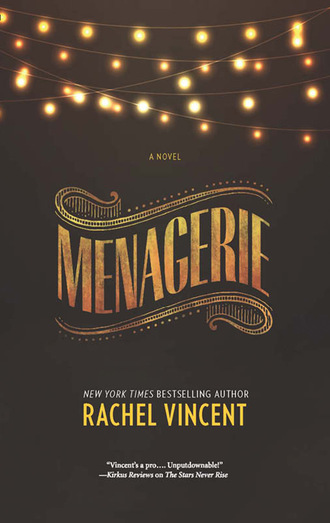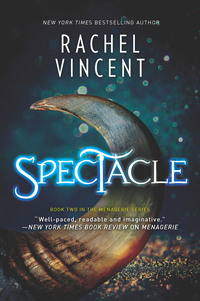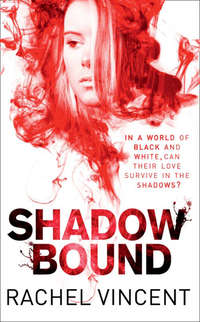
Полная версия
The Menagerie Series
Atherton and Pennington stared at me, and unease churned in my stomach. “There is no we,” the deputy said, and though I’d known that for several hours by then, hearing him verbally exclude me from the rest of humanity added another layer of pain to that brutal certainty. “Delilah, you’re not human.”
“Yeah, well, I guess you’re going to have to take a blood sample to figure out what I am, because I don’t know.”
“Actually, we took one while you were knocked out.” The deputy glanced at my arm, which was when I noticed the small bandage in the crook of my left elbow. “They had to send it up to Tulsa. Your sample’s the lab’s number one priority, but it’ll still take several days.”
I collapsed against the back of my chair, and my aching shoulders sagged with relief. “Then I guess we’re in for a bit of a wait.”
The interrogation room door creaked open and we all turned as another deputy stepped into the doorway. “Mrs. Marlow’s here.”
Sheriff Pennington stood and gave me a grim scowl. “I’m not very good at waiting, so you better hope your mama can shed some light on the subject. Otherwise, things are gonna get real bad for you, real damn fast.”
State agencies report that more than 12,000 parents have been arrested in connection with the August 24 murders of more than 1.1 million children, and an unnamed source in the FBI tells the Boston Gazette that that figure is still rising...
—From the front page of the Boston Gazette, August 28, 1986
Charity
When Charity Marlow’s phone rang at 12:04 a.m., she knew without even glancing at the caller ID that something was wrong. No one ever called in the middle of the night to say everything was fine.
Ten minutes after she hung up the phone, Charity had dressed, brushed her hair, and brewed a pot of coffee. The deputy who knocked on her door declined a travel cup, so she made him wait while she fixed one for herself because “questioning” sounded like the kind of ordeal that would require coherence on her part.
Coherence was the very least of what Charity Marlow owed her daughter, but it was all she had left to give.
On the way to the sheriff’s station, she sat in the passenger’s seat of the patrol car and sipped quietly from her cup, and not once during the drive across town did she ask why Delilah was in custody. Charity had been both waiting for and dreading that night’s phone call for nearly twenty-five years.
At the station, in a small room equipped with bright lights and cheap chairs, she sat across a small scarred table from Matthew Pennington, who’d held the title of sheriff for the past twelve years in spite of her consistent vote for whoever ran against him. Two armed deputies were stationed at the door, one on each side, and Charity saw no reason to pretend she didn’t understand their presence.
“I suppose you want a blood test,” she said before the sheriff could even open his mouth.
He nodded, but she read irritation in the stiff line of his jaw. Pennington liked to run the show. “We’ve got a phlebotomist from County General waiting for that very thing. Of course, you’d be saving us all a lot of time if you could just tell us what you and your daughter are.”
Charity set her travel cup on the table. “Sheriff, if I weren’t human, I wouldn’t exactly feel inspired to bare my soul to you and your gun-toting hee-haws.” She tossed a glance at the deputies beside the door, both of whom scowled at her. “But I am human, and your lab should be able to confirm that with little more than a microscope. And since you clearly know otherwise about Delilah... Well, I’d be just as interested as you are in what the lab has to say about her blood sample.”
Pennington leaned back and crossed thick arms over the brown button-up shirt stretched tight across his soft chest. “You’re telling me you don’t know what species your own daughter is?”
Charity nodded. “In fact, considering that you have her in custody, I’d guess you know more about her genetic origin than I do.”
“Well, you’d be wrong there.” Frustration deepened the sheriff’s voice even beyond the chain-smoker range. “I have her medical records. The blood test they ran at birth says she’s human.”
Charity nodded again, but made no comment.
“According to her record, she hasn’t had blood drawn since the day she was born.”
“I believe that’s accurate.”
“She’s never been sick?” Pennington leaned forward, arms folded over the table, and Charity winced at the acrid bite of cigarette smoke clinging to his uniform. “Not once in twenty-five years?”
“Every child gets sick at some point, Sheriff. But Delilah never had anything I couldn’t treat myself.”
“Because you’re an RN.”
Charity sat a little straighter in her hard plastic chair. “Actually, I’m a nurse practitioner.”
“That’s right,” the sheriff said, but she saw right through his sudden recollection of her employment history. “You finished your MSN when Delilah was three. Was that so that you could legally treat her yourself?”
“In fact, it was. And as her primary medical caregiver, I found no reason to run further blood tests on a perfectly healthy child.” Charity looked right into the sheriff’s eyes. “But I would be willing to tell you what I do know, if you’ll go first.”
The sheriff’s flustered flush was so bright that one of the deputies stepped forward to see if he was okay. Pennington waved the unspoken question off and glared at the woman seated across the table.
“What we know, Mrs. Marlow, is that your daughter got worked up during a tour of the menagerie this evening and turned into the kind of creature that should have been lookin’ outta one of those cages, instead of looking into ’em. She grabbed a carny by the head and sank her fingers into his skull, and when she finally released him, he turned his livestock prod up as far as it would go and rammed it into his own leg.”
Charity’s bold spirit—a thing of wide repute in Franklin County—faded like a blossom gone dry in the sun. She closed her eyes to hide her thoughts from the sheriff, and the face that flashed behind her eyelids belonged to a woman she hadn’t seen in twenty-five years, but would never in her life forget.
“Lilah actually hurt someone?” More than two decades of secrets, lies, and guilt swelled within her as she examined every fear and doubt she’d ever had about the daughter she loved more than anything else in the world. More, even, than the husband whose heart had given out at the age of fifty-seven, beneath the burden of their secret. “I didn’t think she was even capable of violence.”
“Why don’t you tell us what you know?”
Charity crossed her arms over her favorite blue summer sweater and when she leaned back in her chair, a gray-streaked strand of straight brown hair fell over her ear.
“Keeping your secret can’t help her anymore, Mrs. Marlow,” Wayne Atherton said. “We can’t help her either, if we don’t know what she is.”
Unlike Pennington, Atherton truly seemed to want to help, so Charity cleared her throat and took a long sip of her coffee. “Almost twenty-five years ago, my six-week-old daughter disappeared from her crib.”
“You’re telling us that Delilah was kidnapped?” Pennington prompted after a moment of silence, but Charity only shook her head.
“I’m telling you that my daughter Elizabeth was kidnapped. Her middle name was Delilah, so that’s what I called the changeling left in her place.”
For one long moment, neither the sheriff nor his deputy spoke. Charity couldn’t even be sure they were breathing.
“Changeling.” Pennington seemed to be tasting the word, as if he might want to spit it back out. “So, you’re saying the fae took your baby and left a surrogate in its place? There hasn’t been a confirmed surrogate exchange since the reaping.” The sheriff laid both thick hands flat on the table between them. “Mrs. Marlow, are you telling us that your daughter is part of a second wave of attack?”
Atherton slipped quietly out of the room.
“No.” Charity set her coffee down and looked straight into the sheriff’s eyes, so that he couldn’t possibly mistake any part of her bearing or intent. “This is different. I don’t know what those little monsters were, but Delilah isn’t one of them.”
The sheriff crossed his arms above his belly. “How can you be sure? Does she look like Elizabeth?”
“I haven’t seen Elizabeth in twenty-five years, Sheriff, but as infants, they were identical.”
Pennington’s scraggly gray brows rose. “Sounds like a surrogate to me.”
“You’re wrong.” Charity lifted her cup in one unsteady hand and took a sip of the cooling coffee. Then she set the cup down and took a long, deep breath. “Delilah was sent to deliver pain, but not by instilling terror on a national scale like the surrogates. She was left in Elizabeth’s place to punish me. And I got exactly what I asked for.”
“What—”
Charity held up one hand and spoke over the sheriff. “Elizabeth was a beautiful child, but she had an ugly temper. She cried for days and nights on end. I couldn’t eat or sleep. I couldn’t think straight. One day, when she was six weeks old, I prayed that the Lord would take my brand-new baby girl—the center of my existence—and send me a quieter, happier child in her place.”
She pulled a tissue from the purse in her lap and dabbed at first one eye, then the other. “Now, it may be that a lot of women in my position do the same thing, and nothing comes of it. But I...” She leaned forward, and fresh tears fell from her eyes. “Well, Sheriff, I said my prayer out loud. And it wasn’t the Lord who heard me.”
“Who heard you?” the remaining deputy whispered.
Charity twisted in her chair to give him a censuring glance. “Believe it or not, Deputy, no one claimed credit for replacing my daughter with a more pleasant doppelgänger.” She turned back to the sheriff. “So I did some research and learned that I could get in touch with whoever took my daughter if I were to nurse the child for a week, then smear a bit of her blood on a mirror and state my own child’s name.” More inclined toward logic than superstition, Charity had thought the whole thing sounded gruesome and crazy, but the truth was that since the reaping, anything seemed possible. The sheriff eyed her doubtfully, but she continued. “It worked! A woman appeared to me in my bathroom mirror, holding Elizabeth from some room I’ve never seen before.”
“What did she say?” the deputy asked, and the sheriff scowled, but let the question stand.
“She said that in a year, if I had taken proper care of the changeling and still wanted my daughter back, Elizabeth would be returned to me.”
“This woman in the mirror?” The sheriff’s skepticism was fading beneath undeniable curiosity. “Did you get her name? Her species?”
“She wouldn’t tell me any of that. But she looked and sounded as human as Delilah did.”
“So what did you do?” Pennington said, and from across the table, Charity could see that though he held a pen, the notebook page in front of him was completely blank.
“We cared for Lilah as if she were our own. She was a delightful child. Happy and affectionate. We came to love her—I felt guilty for how much I loved her, when my own daughter was missing.” Charity folded her hands on the table and took a deep breath. “Then the one-year mark came and went, and Elizabeth never reappeared.”
“Did you try the blood-on-the-mirror trick again?” the sheriff asked.
Charity nodded. “Several times, but my summons went unanswered.”
“And you never got her back?” the deputy guessed, clearly transfixed by the story.
Pennington waved one hand to silence the deputy, and when he turned back to Charity, she met his gaze with tear-filled eyes. “No, I never got Elizabeth back,” she said. Then she took a deep breath and gave voice to a fear that had lived in her soul for twenty-five years, but had never before been spoken aloud.
“Sheriff, I think my Elizabeth was never returned because I loved Delilah more.”
Delilah
The weight of my mother’s confession steadily pressed the air from my lungs until psychological suffocation felt like a very real threat. I tried to lean forward, staring intently through the one-way glass into the room where she sat, but again chains and cuffs held me painfully short of where I wanted to be.
However, the real trauma went much, much deeper. Brandon had been wrong—there really was a Delilah Marlow. But I wasn’t her.
I closed my eyes and took a deep breath, trying to take it all in. Trying to understand.
I wasn’t my mother’s daughter.
That devastating revelation triggered a landslide of loss, leaving me crushed by the debris of my own life. I had no real name or family. No birthplace or birth date. No true identity. Added to the confiscation of everything I’d ever owned, that left me with nothing but a body I could no longer trust. Though according to Pennington, that was now owned by the state of Oklahoma.
This can’t be real.
What was I, if I had no name, no friends, no family, no job, no home, no belongings, and no authority over my own body? What could I be?
Maybe I was just the good little girl my mother’d begged for. Or maybe I was the monster Sheriff Pennington believed me to be. Maybe I was the first enemy soldier in a secret war against humanity. But could that even be true, if I didn’t know about it?
A strange creak cut through my thoughts, and Deputy Atherton turned away from the window to look at me. “Delilah? Are you okay?”
When I opened my mouth to tell him just how far from okay I was, the creaking stopped. I’d been clenching my jaw so tightly we could both hear the stress.
“You really didn’t know about any of that?” he said, pointing beyond the glass at my mother.
I shook my head. Even after hearing it, I wasn’t sure I truly understood. All I knew for sure was that I was a changeling of unknown origin sent to torture my mother. And that somehow a punishment meant to last a year had lasted a lifetime. For what? For loving me too much?
That wasn’t fair to her. She was a good mother. Yet if whoever’d taken Elizabeth Delilah Marlow—the real Lilah—had brought her back, where would that have left me? Would I have been raised by the woman in the mirror? Was she my mother?
No.
Charity Marlow had been living with her secret for twenty-five years, maintaining her silence to protect me, mourning her real daughter—a baby who’d looked just like me—in private, because the world could not know of her loss. That made her my mother, even if we shared no blood.
Had my dad known?
Yes.
Suddenly my father’s periodic melancholy made sense. What had he seen when he’d looked at me? Could he see the difference between me and his Elizabeth? Had he loved me as much as my mother did?
Had he blamed her for the loss of their true child? Had he blamed me?
“If you tell the sheriff I let you watch, he’ll have my badge.”
Deputy Atherton’s statement sliced through my thoughts so suddenly that it took me a second to understand what he’d said.
I sniffed, unable to wipe either my eyes or my dripping nose. “I won’t tell him.” As the only person to show me even the slightest bit of compassion, Atherton was the closest thing I had to an ally. “Thank you for letting me see my mom. What’s going to happen to her?” I whispered, still staring through the glass.
He shrugged. “If she’s human, she should be fine.”
“She harbored a cryptid for twenty-five years. That’s a felony, Deputy.”
“She was protecting her kid. The sheriff would never...” Atherton didn’t bother to finish. We both knew the sheriff would.
“Mrs. Marlow,” Pennington continued from the next room. “As an officer of the law, I have to ask, why didn’t you turn the changeling over to the proper authorities when it became clear that your daughter was never going to be returned?”
The changeling. He wasn’t even using my name anymore. I’d become a thing.
“She didn’t know she wasn’t human,” my mother said. “I didn’t know for sure. If I’d given her to the police, they would have put her in the state refuge, where she’d have been less than a snack for the first troll or ogre to find her. She was a baby, Sheriff.”
“Yes, and I’m sure she was adorable.” Pennington leaned back in his chair again, and though I couldn’t see his face, I could picture his patronizing expression perfectly. “A few years ago I saw a baby tiger in the zoo, over at Tulsa. It was behind a thick wall of glass playin’ with its handler, chasin’ a bit of string with a stuffed mouse tied at the end. That baby tiger was the cutest damn thing I ever saw in my life.” He paused dramatically. “A year and a half later it ripped that same handler’s arm off and bit through her jugular.”
My mother didn’t even flinch. “You’re suggesting Lilah is like this tiger?”
“I’m tellin’ you she’s worse. The tiger acted on instinct. Your Lilah made a deliberate decision to—” Pennington crossed his arms over his chest. “Well, we’re not sure what she did to that poor man. What we are sure of is that if you’d done your civic duty when she was a baby, we wouldn’t be sittin’ here now. I suspect the state’s attorney will have a few things to say to you about that, but I could put in a word on your behalf, if you were to help us out. We really need to know what she is. You must have seen something when she was growing up that could help us. There musta been signs that she was different from the other girls.”
“There weren’t, Sheriff,” my mother insisted. “That’s why it was so easy for me to believe she was human, no matter where she came from. Lilah was normal. She was smart, and kind, and always the first to go to bat for the underdog. I was always so proud of her.”
My mother’s face blurred beneath tears I couldn’t hold back.
“So, you never saw anything strange about her hair? Or her eyes? Or her hands?” Pennington asked, and my mother shook her head. “Not even when she got riled up about something?”
“No. There was never anything like that.” My mom leaned forward, her arms folded on top of the table, and I recognized the fierce look in her eyes. “Look, Sheriff, I have no idea what Lilah did to that man, but I have no doubt that he damn well deserved it.”
Deputy Atherton twisted a knob at the bottom of the glass, and my mother’s voice went silent. He pressed a button on the same panel, and the glass frosted over until it became reflective again. My viewing was over.
“She loves you.”
“Yeah, and I’m afraid that’s going to get her in serious trouble.” I rotated my shoulders in the futile search for a more comfortable position as he slid into the chair across the table from me. “What’s next for her?”
The deputy exhaled and pushed a strand of brown hair from his forehead. “Pennington’s approved a rush order on her blood test, so we should hear back within twenty-four hours, assuming she’s human.”
Because identifying one of thousands of cryptid species by blood was complicated, but confirming humanity was pretty quick.
“She’ll have to stay here until we’re sure, though.”
“Can’t you just let her go home? She’s no threat, Deputy.”
Atherton shook his head. “Standard procedure, for public safety. Anyone suspected of having cryptid blood has to stay in custody until the results are in. I’ll take her some coffee and a stale cinnamon roll, but that’s the best I can do.”
“What about me?” I shifted in my seat, trying to ease the pressure on my shoulders. “Am I going to sit in a cell until they figure out what I am?”
“Looks like it, and you should probably consider that a stroke of luck. Pennington’s had a couple of the guys out front looking at options for where to send you since before you woke up, and the very best of them is going to make this place look like a luxury hotel.”
A fresh jolt of fear tightened my chest. “Please tell me Pennington’s not the final authority.”
Atherton shrugged. “The law’s a little fuzzy on that. If that carny was in the morgue instead of the psych ward, Pennington would have to call in the state police. That’s standard for all capital offenses. But since he doesn’t have to make that call, he’s probably not gonna. If you turn out to be a surrogate, you fall under federal jurisdiction, but that’s another call he’s not going to make unless he has to.”
“So my fate is in the hands of the sheriff of a county with fewer than fifteen thousand people in it.” My mouth was dry, and my hands had gone numb, but because I wasn’t human, they could keep me as long as they wanted without so much as a sip of water or a trip to the bathroom.
“Yes, but I think you’re better off here than you would be in state custody.” The deputy folded his hands on the table while I watched him through a strand of hair that had fallen over my eye. “The state reservation is over capacity. They’re sendin’ the overflow straight to an R & D holding facility, and that place...”
Atherton stared down at his hands, and the fact that he was clearly stalling made my heart beat too hard.
Cryptid research and development was big business, with both the government and the private sector, but regulation was virtually nonexistent. Animal activists raised hell if a pharmaceutical company wanted to test new shampoo on a sewer rat, but R & D could inject environmental toxins beneath a selkie’s removable seal skin all day long and no one blinked an eye.
“They don’t tag ’em or count ’em, Delilah. I made a couple of calls, and a guy in records told me that since the lab opened fourteen years ago, they’ve sent in more than five times the max capacity—all kinds of cryptids—and there’s no record of any of them ever officially leaving the facility. But they fire up the industrial incinerator about once a week.”
My pulse jumped, and I struggled to keep breathing slowly. Evenly. “What’s the alternative? Hotel California?”
The deputy nodded. “Otherwise known as the Oklahoma Cryptid Confinement Center.”
“Same thing.” Because there, every sentence that wasn’t a life sentence was a death sentence.
“The only other option I can think of would be a private collection. I know this guy out in—”
“No.” Chills shot up my spine. Werewolves on leashes, declawed and walking around like pets. Selkies and naiads swimming in giant koi ponds. Fauns serving drinks at private events in nothing but gold chains and collars. I shook my head vehemently. “I’m nobody’s pet.”
“That’s not up to you.” Atherton leaned back in his chair, his forehead crinkled in irritation. “I’m going out of my way to help you, and your appreciation looks a lot like ingratitude.”
Indignation sharpened my vision until I finally saw the deputy clearly. “You want me to be thankful that you’re willing to sell me as a living party favor instead of sentencing me to a cryptid prison?”
The deputy’s eyes narrowed. “You need to take a good, objective look at what you’re facing here, Delilah. OCCC is an open-population cryptid prison. There are no guards. No cells. No rules. Helicopters make periodic supply drops on the grounds. You’d fight for every scrap of food and clothing until the day some troll or adlet eats you for breakfast. Is your pride really worth dying for?”
Fuck! I closed my eyes and clenched my fists over and over, wishing that the rest of me would go as numb as my fingers.
“And at least in a collection you’d be alive and in good health. No collector is going to let any serious damage come to property he spent good money on.”
Property. Damage. Money. I would be an exotic pet. An insured asset in some rich prick’s ledger. Because even animal lovers keep dogs on leashes.
The deputy shrugged. “I could say something to the sheriff about a private collector,” he offered. “He’d have to think it was his own idea, but that shouldn’t be hard. He still thinks it was his idea to install a vent fan in the men’s room, and—”












